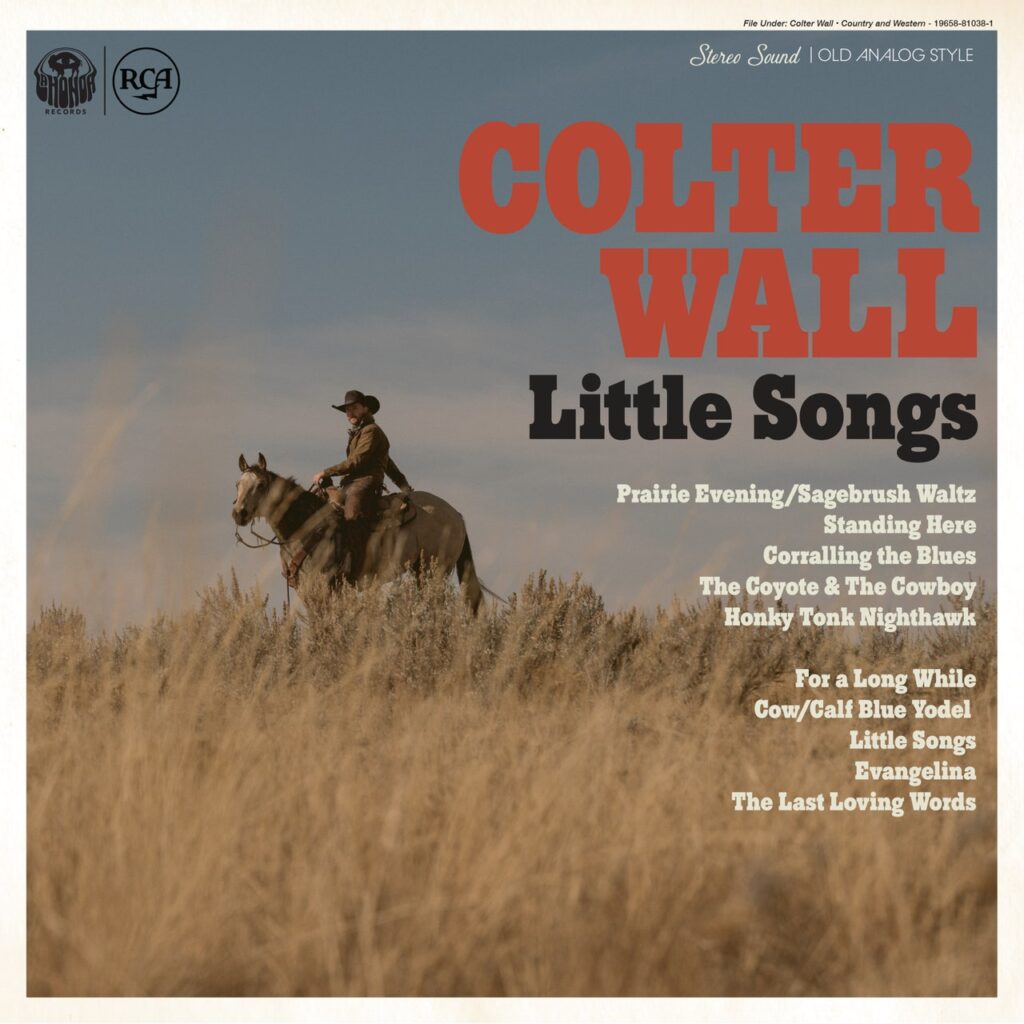Across his recent albums, Colter Wall has turned the vistas of his native Saskatchewan into old-timey slideshows full of hardscrabble folk heroes roaming the land, weary cowboys trading campfire tales, and couples two-steppin’ across the worn, wooden floors of an old barn. While the imagery has been consistent, the soundtrack has evolved. After working with producer Dave Cobb on 2018’s stark Songs of the Plains, Wall self-produced his follow-up, 2020’s Western Swing & Waltzes and Other Punchy Songs, and incorporated his longtime touring band to capture a more bountiful sound. With his fourth album, Little Songs, he further saturates the picture with a focus on original fare that feels less like homage and more like habitation.
The sense of confidence can be credited to Wall’s creative partnership with bandmate Patrick Lyons, who co-produced Little Songs. They no longer simply nod to the past and its looming figures—Hank Snow, Ernest Tubb, George Jones, and of course, Johnny Cash—but immerse themselves in the era completely. Compared to contemporaries like Charley Crockett, Wall doesn’t seem interested in modernizing his music or playing with form. “Well I don’t care what’s cool or where it’s at,” he sings on “Honky Tonk Nighthawk.” The fiddle-heavy arrangement evokes the warm press of an audience swirling in tandem, and it sits alongside a blustering cover of Canadian singer-songwriter Ian Tyson’s “The Coyote & the Cowboy,” where Wall’s sings in a gruff growl that thickens the song’s wit like a roux.
Listening to Little Songs can feel like dropping a coin into the local nickelodeon and watching the past flicker to life, and much of that movement comes from Wall’s band. Their radiant performances flesh out the record long after Wall’s voice, all wood-grained weft and warble, has quieted. You can hear their magic in the sashaying, doubled electric guitar solo on “Honky Tonk Nighthawk” and in Lyons’ twinkling pedal steel lacing around “Prairie Evening/Sagebrush Waltz” like the most delicately stitched trim. When Wall’s narrator spies a woman “shaming the glow of the moon” at a local dance on “Prairie Evening,” the song blossoms into a summery waltz, the bass harmonica and fiddle rippling against one another.
Given the space to play, there are times when the band overshadows Wall’s lyrics. The disjointed “Standing Here” details a moment of pause that leads to a few meandering reflections: about the country, about people these days, about the music industry. But Wall falls short of larger poignancy, and the band fills that gap with a lively do-si-do jam. He fares better in “Corralling the Blues,” as close to a confessional as he has dared. In a land where “the sky seems to end 50 feet up,” as author James Welch writes in Winter in the Blood, the blues don’t seem to hang heavy the way they do in more harried locales. Yet, Wall divulges over brooding acoustic guitar that he’s battled an affliction since “before I was grown.” A ruminative harmonica from Jake Groves flutters and suggests a daydream yearning for a mind less weighted.
When faced with the vast emptiness of prairie life, work can keep an agitated mind busy for only so long; it takes something bigger to beat the blues. With its pacing title track, Little Songs offers a sentimental theory for one possible remedy. “You won’t get much on mountain time/Except older and a thicker hide,” Wall sings with a wink. “You got to fill the big empty/With little songs.” He delivers these lines like a seasoned storyteller, reminding himself of the timeless feelings that drive us to keep the music playing, whether it’s old or new.
All products featured on Pitchfork are independently selected by our editors. However, when you buy something through our retail links, we may earn an affiliate commission.

